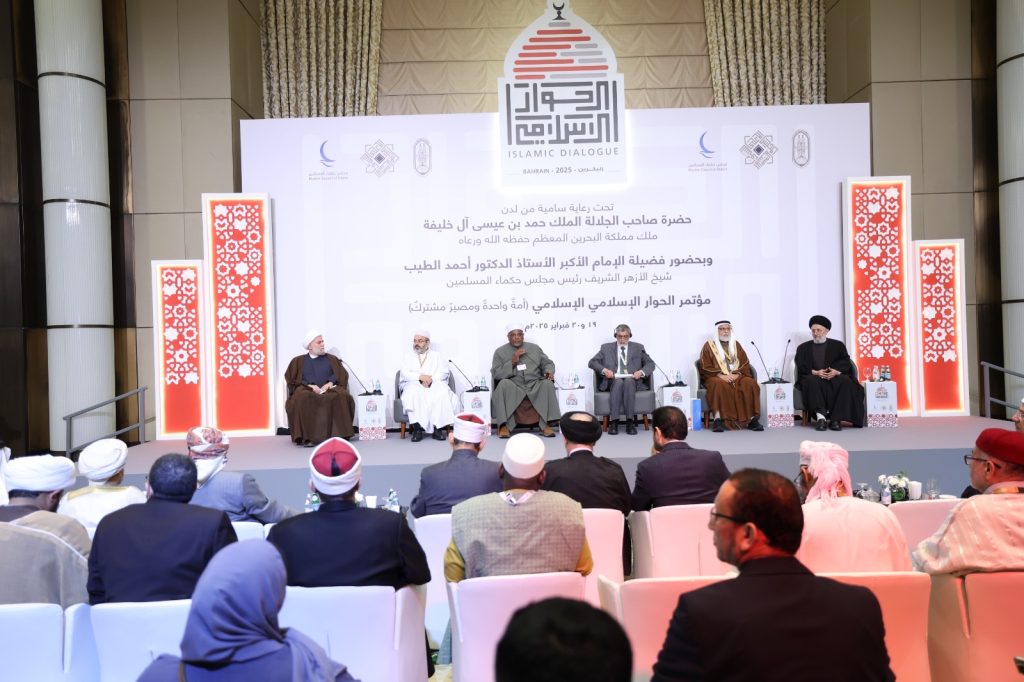The fifth working session of the Intra-Islamic Dialogue Conference, themed “One Nation, One Shared Destiny,” took place in the Kingdom of Bahrain under the title “Responding to the Challenges of Achieving Intra-Islamic Understanding.” Chaired by His Eminence Professor Dr. Abbas Shoman, Secretary-General of the Council of Senior Scholars at Al-Azhar, the session featured an elite panel of scholars from various Muslim countries.
During his address at the conference, His Eminence Ayatollah Dr. Sayyid Abu al-Qasim Al-Dibaji, Secretary-General of the World Organization of Pan-Islamic Jurisprudence, highlighted that the gathering represents a pivotal moment in promoting unity among the Muslim Ummah, renewing commitment to shared values, and consolidating efforts to tackle challenges.
He added, “Today we gather at this dialogue conference to discuss a critical issue concerning the fate of our Muslim Ummah: the question of Islamic unity. It is not merely a slogan to be raised at forums or just words to be repeated on occasions; it is a way of life and a fundamental pillar for achieving the renaissance and dignity of this nation, united by one faith and a lofty purpose. To strengthen unity, practical steps must be taken through fostering constructive dialogue among scholars from different schools of thought, not only through conferences and forums but also through media discourse and educational curricula that embed a culture of understanding.”
His Eminence Professor Dr. Mustafa Baju, Professor of Islamic Jurisprudence at the University of Ghardaia and a member of the High Islamic Council of the People’s Democratic Republic of Algeria, discussed the challenges impeding intra-Islamic understanding and ways to address them. He emphasized that challenges are an inherent part of the universal order, and conflict and competition are essential aspects of any endeavor that aims to improve humanity, particularly evident in prophetic messages, with Islam at the forefront. Addressing these challenges requires the application of informed wisdom and genuine efforts, which foster a positive environment conducive to realizing the civilizational presence of the Ummah. Achieving this is feasible through sincere steps toward establishing meaningful Islamic dialogue, which would result in the aspired understanding and the building of a wise human society within a true civilization.
Sheikh Dr. Abdul Latif Mahmoud Al Mahmoud, a member of the Supreme Council for Islamic Affairs, presented a paper focusing on vision, concepts, and methodology, joined by council members Sheikh Dr. Farid Al-Miftah and Sheikh Dr. Ibrahim bin Rashid Al-Marikhi. Sheikh Al Mahmoud emphasized that the diversity of Islamic thought, resulting from precise jurisprudential interpretations, should be a catalyst for unity and understanding, not discord and division. He noted that differences are a universal constant and should not be seen as a cause for division, highlighting that Allah Almighty has ordained cooperation among Muslims in goodness and righteousness.
He underscored the importance of acknowledging that differences among leading jurisprudential, doctrinal, and philosophical scholars have not eroded their mutual respect or the benefits derived from such relationships. He stressed that preventing discord due to these differences relies on understanding each perspective to maintain the faith-based Islamic fraternity as decreed by Allah Almighty.
Additionally, he pointed out that comparative studies aid students of Sharia and other disciplines in understanding diverse viewpoints, provided they rely on the original sources of those differing opinions. He also suggested that intra-Islamic dialogue should adhere to a set of principles, notably recognizing the commonalities among various schools of thought.
His Eminence Sheikh Nasser Ahmed Khalaf Al-Asfoor, a member of the Supreme Council for Islamic Affairs in the Kingdom of Bahrain, discussed the challenges to achieving intra-Islamic understanding during his presentation at the conference. He was accompanied by fellow council members Dr. Suleiman Sheikh Mansoor Al-Sitri and Sheikh Mohammed Hassan Abdulmehdi Al-Sheikh. Their paper highlighted that Islam, with its grand principles and gracious teachings, encourages Muslims to coexist peacefully, practice tolerance, offer sincere counsel, and eschew division and conflict.
The paper recommended bolstering doctrinal and ideological dialogue among scholars and thinkers from various Islamic sects and enhancing religious education curricula to instill values of tolerance, understanding, and sincere counsel. It also advocated for supporting media outlets that promote balanced awareness and for establishing platforms and institutions that unite Muslims around shared values, address differences, and raise individual and societal awareness and culture. The paper emphasized that fostering Islamic understanding is a collective responsibility that necessitates ongoing efforts at both individual and communal levels.
His Excellency Sir Iqbal Abdul Karim Sacranie, Senior Advisor at the Muslim Council of Britain, highlighted the essential need for intra-Islamic understanding within the global Islamic community. He advocated for strengthening dialogue, education, and cooperation to help Muslims overcome challenges and build a more cohesive Ummah. H.E. Sir Iqbal emphasized that collective efforts grounded in shared Islamic values could lead to greater harmony.
It is worth noting that the Intra-Islamic Dialogue Conference was convened in response to an invitation from His Eminence Prof. Dr. Ahmed Al-Tayeb, Grand Imam of Al-Azhar and Chairman of the Muslim Council of Elders, during the Bahrain Dialogue Forum in November 2022. The event is held under the generous patronage of His Majesty King Hamad bin Isa Al Khalifa, King of the Kingdom of Bahrain. The gathering attracted over 400 scholars, leaders, Islamic authorities, and influential figures from the Islamic world, aiming to foster Islamic unity and establish a permanent scholarly dialogue mechanism among Islamic scholars and authorities worldwide.

